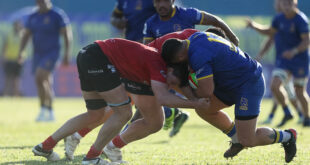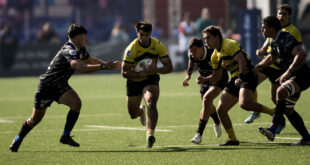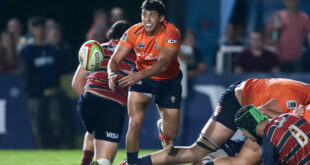A tale of two stories is set to see the Americas given the green light from World Rugby authorities. In addition to Argentina obtaining equal power to the founding members, Canada, Uruguay and the USA are all on track to obtain voting power on the World Rugby Council, Meanwhile the Pacific Island nations of Fiji, Samoa and Tonga are facing oblivion.
World Rugby Voting Reform
In an effort to appeal to greater numbers reform to the governing body of rugby is underway. With it more Tier 2 unions are set to be allocated voting rights, so long as they can meet the stated requirements.
The requirements are tough, more so for some than they are for others. On the line is the possibility of having up to three seats per union on the World Rugby Council. But for unions to acquire just one vote they are going to need:
- To have played in the past two Rugby World Cups
- Have an annual audited average investment in rugby of US$30million over the last four years
- Have bid or be bidding for a major World Rugby event over the past eight years
- Have a Women’s Rugby program
- Either have played in qualifiers or competed in the Women’s Rugby World Cup
- Have a Men’s and Women’s Rugby Sevens program currently competing in international competition
Losers
Satisfying these conditions are to be extremely complicated for Fiji, Samoa and Tonga and, as such, Pacific Island voting power per union appears likely to remain at nil. Their collective voting power until now has come from the regional association Oceania vote, making them as powerful collectively as Japan or Canada who carry one cote each at present.
Fiji, Samoa and Tonga have all had brilliant moments on the global stage. In Rugby World Cup 2007 Fiji defeated Wales to eliminate them at the group stage and then went on to give, eventual winners, South Africa a serious Quarter Finals showdown. Samoa came close to doing the same thing four years on while Tonga defeated finalists, France in their pool at the same tournament.
Such commendable performances, though, are not sufficient for any of the three to obtain equal rights to other unions under World Rugby’s voting structure reform.
Those conditions will restrict eligibility for the likes of Pacific Island unions Fiji, Samoa, and Tonga, one of whom has made the quarterfinals at four Rugby World Cups, have players of their descent in most of the major teams, and suffered more than most from having to share one voice and vote on the council.
The instability is entirely real and so much so that New Zealand sources have reported that Pacific Island rugby is in danger of being left behind. At the next World Rugby council meeting in May none of the three are expected to be coming close to meeting the above stated requirements.
This past week Tonga reached crisis point with World Rugby freezing funding to the union. Like both Fiji and Samoa, Tonga has been surrounded by issues of debt, corruption and serious mismanagement. But unlike the other two, the extent of Tonga’s problems are so troublesome that the country has been unable to host a test match for six years.
Tonga’s upcoming international against Georgia is set to be played in Fiji not Tonga due to Nuku’alofa lacking a World Rugby approved field. Barring a miracle Tonga will also miss out on hosting Wales in mid 2017 when the Welsh play test matches in the region.
Winners
The bad news for the Pacific Islands is in stark contrast to that set to be gained by the remaining Tier 2 unions. Will Glenwright, World Rugby’s Asia and Oceania general manager, painted it clearly: “at this point in time the three Pacific Island unions don’t meet that governance criteria.”
New Zealand Players’ Association chief executive, meanwhile, Rob Nichol said “they need to understand they are competing for the dollar with countries that are showing excellent governance – the likes of Georgia, Canada, Romania, Russia. It is a competitive situation.” He added “World Rugby needs to have absolute confidence in the developing nations they invest in.”
Of those named by Nicol Romania and Russia already have some form of professionalism. Both Georgia and Canada are well advanced in other areas with professionalism seemingly a matter of not if but when for both.
This past week Bryan Ray detailed who Canada’s professional teams could be and chances are very good that Canada could either enter teams in PRO Rugby in 2017 or establish a professional Canadian league. Regardless, Canada and the USA are certainties to meet World Rugby’s requirements thereby giving both, and the Americas, increased decision making power. The same is true of Georgia, Romania and Russia which will give Eastern Europe votes for the first time.
A fourth union from the Americas pushing for voting rights is Uruguay. The URU has been working extremely hard to modernize and has done so with tremendous results in a very brief period of time. Uruguay’s win over the USA in the Americas Rugby Championship was built upon the pillars of change which have seen the establishment of a High Performance Center, the contracting of players and a stated goal of having a professional team over time.
Uruguay’s economic situation has also drastically improved and this has greatly pleased World Rugby to the extent that the URU is very close to being confirmed as a Tier 2 rather than a Tier 3 union. A record number of test matches have also been confirmed for 2016 which, combined with the union’s governance and financial status suggest Uruguay has the means to acquire a vote. The same is not true of Namibia which is remarkable considering Namibia has played at the past five Rugby World Cups.
 Americas Rugby News Rugby news from across the Americas!
Americas Rugby News Rugby news from across the Americas!




